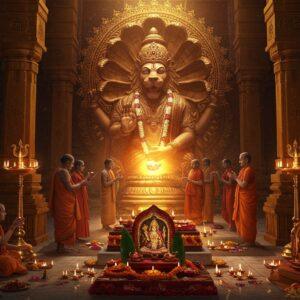
In the tapestry of Hindu culture, the Naamkaran ceremony shines as a deeply meaningful event, marking the commencement of a child’s life journey. Naamkaran, meaning “naming ceremony” in Sanskrit, is a sacred rite of passage—a samskara—that binds families and communities through shared traditions and divine blessings. This ritual is pivotal in shaping a child’s identity, reflecting the values and beliefs at the heart of Hindu society. Understanding Naamkaran offers a glimpse into how these ceremonies preserve cultural continuity and foster auspicious beginnings.
The Significance of Naamkaran in Hinduism: A Historical and Cultural Perspective
Rooted in ancient Vedic traditions, the Naamkaran ceremony symbolizes the profound connection between a name and an individual’s destiny and character. The selection of a name is a thoughtful process often guided by:
-
Astrological Considerations: Aligning the name with the child’s birth Nakshatra (lunar constellation) is a common practice, seeking harmony between the cosmos and the child’s life.
-
Family Traditions: Honoring ancestors or paying homage to revered deities through names keeps the family lineage and spiritual heritage alive.
-
Cultural Variations: The diverse tapestry of India’s regions results in variations in Naamkaran practices, a testament to the richness and adaptability of Hinduism.
Naamkaran transcends being merely a family affair; it unites communities and involves religious leaders who guide the rituals, strengthening social bonds. In contemporary times, particularly within the diaspora, traditional Naamkaran practices intertwine with modern lifestyles, demonstrating the enduring relevance of this cherished tradition. Find everything you need for a traditional ceremony on poojn.in, India’s leading online store for puja samagri.
Naamkaran: A Joyful Rite of Passage
The Naamkaran ceremony is a joyous celebration of a new life entering the family and community. Typically held within a few weeks of the baby’s birth, this samskara formally recognizes the child as an individual and welcomes them into the fold.
Choosing the Auspicious Time
While traditions may vary across regions and families, the 11th or 12th day after birth is often preferred for the Naamkaran ceremony. Some scriptures recommend the first new moon or full moon after the 10th day. Other families opt for the 21st day or consult the baby’s birth chart to determine the most auspicious date.
The Heart of the Ceremony: Purpose and Spiritual Significance
The core purpose of Naamkaran is to formally bestow a name upon the child. This name, carefully selected using traditional methods and astrological considerations, becomes an integral part of the child’s identity. The ceremony also serves as a beautiful occasion to celebrate the newborn’s arrival with loved ones, solidifying their place within the family and community.
Sacred Rituals and Practices
The Naamkaran ceremony often unfolds with a priest leading prayers and chanting mantras, invoking blessings from deities and ancestors. The selection of the name is guided by cultural, family, and astrological traditions, often considering the baby’s nakshatra (birth star). Ancient texts offer wisdom in this process, favoring names associated with deities, virtues, or elements of nature.
-
In some traditions, the father symbolically writes the chosen name in rice grains spread on a bronze plate using a gold stick, a gesture rich with meaning. He then whispers the name into the baby’s right ear, repeating it several times along with a prayer, a tender moment of connection.
-
Elders shower the child with blessings, and guests offer gifts to the newborn and parents, symbolizing their support and well wishes. The family astrologer may present the child’s horoscope, offering insights into their future.
-
In a heartwarming gesture, the baby may be given a taste of honey and ghee, symbolizing sweetness and purity in life. Finally, the chosen name is formally announced to all present, marking a significant milestone.
You can find authentic puja items, including pure honey and ghee, on poojn.in.
Choosing a Name: Considerations and Traditions
Choosing a name for a child is a significant decision. Traditions often involve looking at the astrological signs at the time of the baby’s birth for guidance. Names may be chosen to embody specific qualities or honor deities. Traditionally, boys’ names might have two or four syllables, while girls’ names often have an odd number. The name should have a pleasant sound, carry positive connotations, and avoid any negative meanings.
Some families even choose five names based on factors such as rashi, nakshatra, masa (month of birth), family deity, and a name for everyday use. Find the perfect item on poojn.in for blessings.
Modern Adaptations
While traditional names hold steadfast popularity, there’s a growing trend of creating unique names or embracing Western names. This adaptation reflects the changing times while still holding onto the essence of cultural heritage. Discover various puja items on poojn.in from different brands.
Poojn.in: Your Partner in Naamkaran Celebrations
At poojn.in, we understand the significance of Naamkaran and strive to make your preparations seamless. We offer specially curated Naamkaran Samagri Kits, thoughtfully assembled by our Pandit experts, containing all the essential items for the ceremony. Our kits include a pure copper kalash, fresh coconut, roli, rice, cotton wicks (batti), pure ghee, Gangajal, incense sticks and dhoop, fresh flowers, and a puja thali set. Check out our beautiful clay diyas here.
We source our Naamkaran items directly from trusted manufacturers and temples, ensuring authenticity and superior quality. With delivery across India, we bring convenience to your doorstep, saving you the hassle of multiple shopping trips.
Need personalized guidance? We’re here to help! Our team can assist you with choosing items from our wide selection of low value product. You can contact us by phone, or via WhatsApp.
-
Call: 03369029784
-
WhatsApp: 9476142738
-
Visit: www.poojn.in to explore our complete collection.
We also offer expert advice on the proper usage of samagri items and can connect you with experienced Pandits to conduct the ceremony. All our products are carefully packaged to maintain their purity and are delivered right to your doorstep. Cycle brand puja items are very popular & you can find them here. Looking for Dashakarma items, explore them here. You can even find pure Hanuman Sindoor here. Also, check out our handmade Manasa Puja Ghat here.
Please note: Prices and availability of items may vary. Check our website for the latest details.
Embracing Tradition in the Modern Age
The Naamkaran ceremony beautifully intertwines tradition with the joy of new beginnings. It’s more than just giving a child a name; it’s a heartfelt celebration that brings families and communities together in shared happiness and blessings. As families come together to honor this sacred ritual, they cherish the past while embracing the present, ensuring that cultural heritage thrives in today’s world. Whether choosing a traditional name or a modern one, the essence remains the same – a name given with love and hope, guiding the child towards a future filled with promise. You might also like our blog posts on Krishna’s Names and the story of Krishna and Radha.
Common Questions about Naamkaran
What is Naamkaran in Hinduism? Naamkaran is the Hindu baby naming ceremony, a sacred ritual where a newborn is formally given their name. This ceremony signifies the child’s identity and marks their journey in life, rich with cultural significance. It is believed to bestow blessings and good fortune upon the child.
Why is Naamkaran important? It’s a pivotal moment, officially introducing the child to the family and community. It carries the weight of tradition and is believed to bring blessings and set a positive course for the child’s life.
When is the Naamkaran ceremony performed? Traditionally, the 11th or 12th day after birth is considered auspicious. However, it can vary based on family customs, regional practices, and the child’s well-being, sometimes taking place on the 21st day or another suitable date.
How is the Naam Karan ceremony conducted? The ceremony usually begins with prayers and mantras to invoke divine blessings. The chosen name is whispered into the baby’s right ear, often by the father or a priest, followed by blessings from family members. Kakkal, Pancha Kasai, and Kalwa Raksha Sutra are commonly used. Kalwa Raksha Sutra is essential for many Hindu ceremonies.
What factors influence the choice of a name in Naam Karan? Astrology, family traditions, and the baby’s horoscope often guide the name selection. Some families choose names based on the child’s Nakshatra, while others consider names of deities or virtues.
Can Naam Karan be done at home? Absolutely. While some prefer a temple setting, many families perform Naam Karan at home, often with guidance from a priest.
Is Naam Karan the same in all Hindu communities? While the core essence of welcoming the child into the family remains universal, there may be variations in specific rituals and traditions across different communities.
What role do grandparents play in Naam Karan? Grandparents often hold a special place in the ceremony, sometimes suggesting names based on family history and showering blessings on the child.


